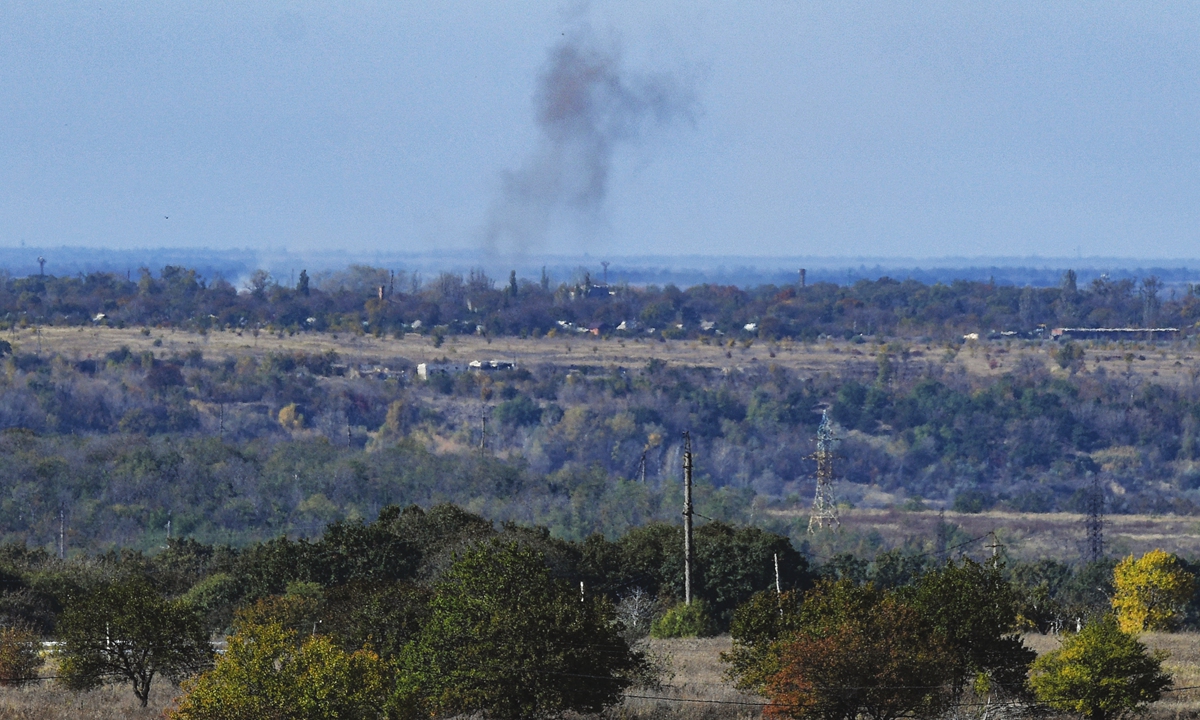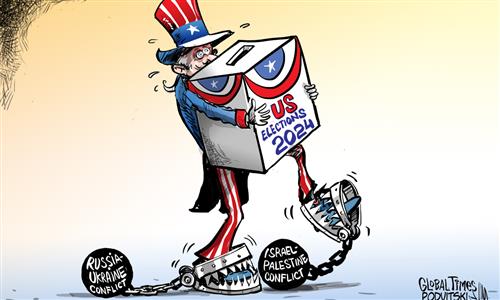Western governments have not embraced wise policy objectives to promote a cease-fire in Russia-Ukraine conflict: US author

Smoke rises above the area of the frontline town of Avdiivka, Ukraine on October 18, 2023. Photo: AFP
Editor's Note:
Almost two years into the war between Russia and Ukraine, war fatigue is becoming gradually prominent in the West. In the US, Ukraine's biggest single-country donor, we have seen uncertainty loom for future aid to Ukraine in recent days. Nevertheless, many in the West still hold the view that the US and other Western countries are doing the right thing in this conflict.
In an email interview with Global Times (GT) reporter Xia Wenxin, Benjamin Abelow (Abelow), the Washington-based author of the book How the West Brought War to Ukraine: Understanding How US and NATO Policies Led to Crisis, War, and the Risk of Nuclear Catastrophe, shared his thoughts on topics, such as the West's role in the Russia-Ukraine conflict, the future of the US' Ukraine aid, and the possibility of a cease-fire in Ukraine. He writes, lectures, and lobbies Congress about nuclear arms policy.
GT: Your book, How the West Brought War to Ukraine: Understanding How US and NATO Policies Led to Crisis, War, and the Risk of Nuclear Catastrophe, published last year, has been recognized by great minds, including US scholar Noam Chomsky. Can you elaborate on your main argument in the book?
Abelow: I wrote this book to correct a widespread Western misconception about the causes of the Russia-Ukraine war. Western governments and media have persuaded their citizens that Mr. Putin invaded because he wished to expand Russian territory - in effect, to reestablish the Soviet Union or the Tsarist empire. The reality is that Putin was responding to three interrelated security threats.
First, it is the threat of the expansion of NATO to Russia's borders and the increasing integration of Ukraine into Western military structures. I do not believe that the US was planning to attack Russia. I think that most American planners viewed their actions as defensive. But they should have looked at things through Russian eyes. They should have asked themselves how they themselves would have reacted if the situation had been reversed. If a Russian military alliance had encircled the US and pressed against its borders, the US might have gone to war, too.
Second, the US withdrew from two key nuclear arms control treaties with Russia - the Intermediate-range Nuclear Forces (INF) treaty and the Anti-Ballistic Missile (ABM) treaty. In withdrawing from the INF treaty, the US claimed the right to deploy land-based nuclear missiles in Europe directed against Russia. To make matters worse, the ABM systems that the US is placing in Romania and Poland can be modified to launch offensive, nuclear-tipped missiles. In the absence of the ABM and INF treaties, Russia feared that the US might place offensive missiles close to its border, perhaps right in Ukraine, and might be tempted to launch a first strike.
Third, in 2014, the US supported groups in Ukraine that replaced a pro-Russian president with a far-right government that was implacably hostile to Russia. As a result of this takeover, a civil war broke out in eastern Ukraine. The US impeded the peaceful resolution of this war. This civil war created instability on Russia's border and endangered pro-Russian Ukrainians who were living in parts of eastern Ukraine.
GT: In fact, your views in this book don't really fit into the current mainstream narrative of the Russia-Ukraine conflict in the West. How has the dominant Western narrative influenced the war in Ukraine?
Abelow: The Western narrative, that Putin was trying to reestablish the Russian empire, has influenced the war in several harmful ways.
To begin with, the narrative helped cause the war. If that false narrative had not existed, it is quite likely that the US would have been willing to negotiate about NATO expansion, based on proposals that Putin put forward in December 2021. Furthermore, the US probably would have actively worked to resolve the conflict in eastern Ukraine, and to press Ukraine to implement the "Minsk II" peace accords. Even if nothing else had been different, the implementation of these peace accords might have prevented the war.
Next, once the war started, the false narrative about Russia's motivations led Western countries to block a peace settlement between Ukraine and Russia. In fact, a peace treaty was being negotiated between Ukraine and Russia within a few days after Russia launched an offensive against Ukraine. The US and Britain sabotaged these negotiations, and because of the false narrative, the US pressured Ukraine to launch a suicidal counter-offensive, even though the US knew that Ukraine did not have adequate training or weapons to succeed.
Many Ukrainian and Russian men have died, and the world has been put at risk of nuclear war because the US refused to renounce NATO membership for Ukraine. Western leaders claim that their support of Ukraine is humanitarian. In truth, it is promoting conflict and destroying Ukraine.
GT: Many in the US worry that the conflict between Israel and Hamas will draw attention away from Ukraine and even affect aid to Kiev. What is your take on this?
Abelow: The conflict between Israel and Hamas certainly has diverted attention from Ukraine in the media, the Congress, the Biden administration, the Pentagon and among US citizens. At least for now, funding and weapons are being prioritized for Israel, at the expense of Ukraine. My guess is that the Gaza conflict will result in an ongoing loss of American interest in Ukraine.
GT: You once stated that "there is only one solution to the ongoing disaster in Ukraine. It is not a good one, but it is the best one available: to immediately press for a cease-fire, followed by a negotiated settlement." What do you think is the biggest obstacle to a cease-fire between Russia and Ukraine now? Many countries, including China, are calling for a cease-fire, but why does it seem that there aren't many such voices from the West?
Abelow: I believe that the biggest obstacles to a cease-fire in Ukraine are the US policy elite and the far-right neo-fascists in Ukraine. The peace frameworks that China and other countries have put forward have made a great deal of sense. It is disappointing to me that the Western governments, especially that of the US, have not embraced equally wise policy objectives. I see several reasons for this.
On the one hand, the military-industrial complex exerts a pervasive influence on US policy. It tilts the entire "playing field" toward military approaches to problems that could better be addressed through diplomacy.
On the other hand, the mainstream media has become the handmaiden of the American foreign policy establishment. The media has proved that it's a powerful vehicle for what several scholars, including Noam Chomsky, have called the "manufacture of consent"—that is, the manipulation of public opinion to support policies desired by the Washington elite.
Finally, I believe that too many in American public life are driven by ignorance, xenophobia and a psychologically rooted fear. They imagine that an omnipotent US military will protect them. In fact, I believe that the overemphasis on military power is making the US less secure, not more secure.
GT: As the world seems to enter an era of turbulence and distrust, are you concerned about the possibility of a new arms race (especially nuclear arms)?
Abelow: When I observe the foolhardy and reckless mindset, statements and behavior of the Washington elite, I am reminded of a statement by Albert Einstein: "With the splitting of the atom, everything has changed, save our modes of thinking, and hence we drift toward unparalleled catastrophe." It is essential that the US and China recognize and act on their shared interest in preventing an expensive and destabilizing nuclear arms race.
I hope and believe that the current differences between the US and China will be temporary. A primary goal during this period of tension must be to minimize the risk of war between these two great nations. A nuclear war could begin by accident, misunderstanding, computer error or through escalation of a conventional conflict. It could destroy both countries, and even destroy human civilization on earth. It is paramount that both countries avoid this outcome.
GT: NATO is gradually extending its reach from the North Atlantic to the Asia-Pacific region. How do you assess this move by NATO? How will it affect the regional situation?
Abelow: I believe that the US and NATO are making the same dangerous mistakes they made with NATO expansion in Europe. I see too many in Washington acting disrespectfully to the leaders of other nations. They are relying too heavily on military deterrence and not enough on mutually beneficial diplomacy. They fail to recognize that what appears to be defensive to one nation may be perceived by the other nation as an offensive threat. This can contribute to a cycle of escalation that leads to war.
My impression of the Chinese leadership is that it has shown prudence, even as too many in the US are acting foolishly. I hope that the Chinese leadership continues to follow a path of prudence. It is my belief that when two great countries are undergoing a period of tension, and one country is acting irresponsibly, it is the burden, as well as the glory, of the other country to act with wisdom for the benefit of both parties, and for the benefit of all the peoples of the earth. Currently, I believe this burden is falling heavily on China.

